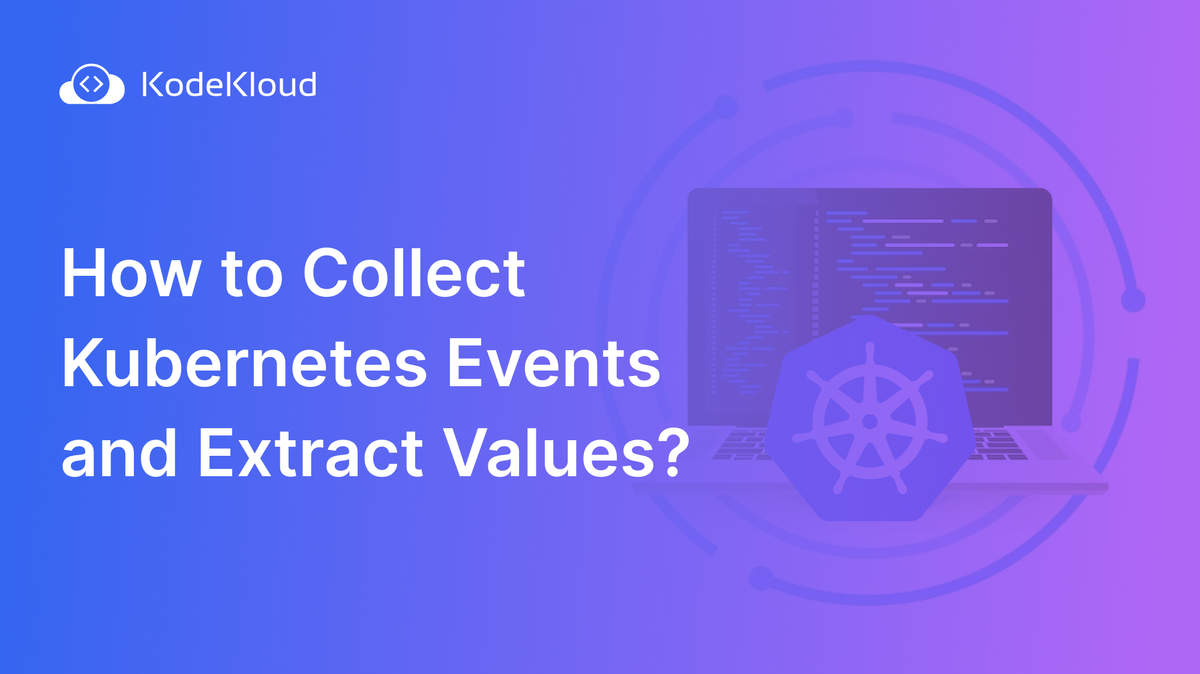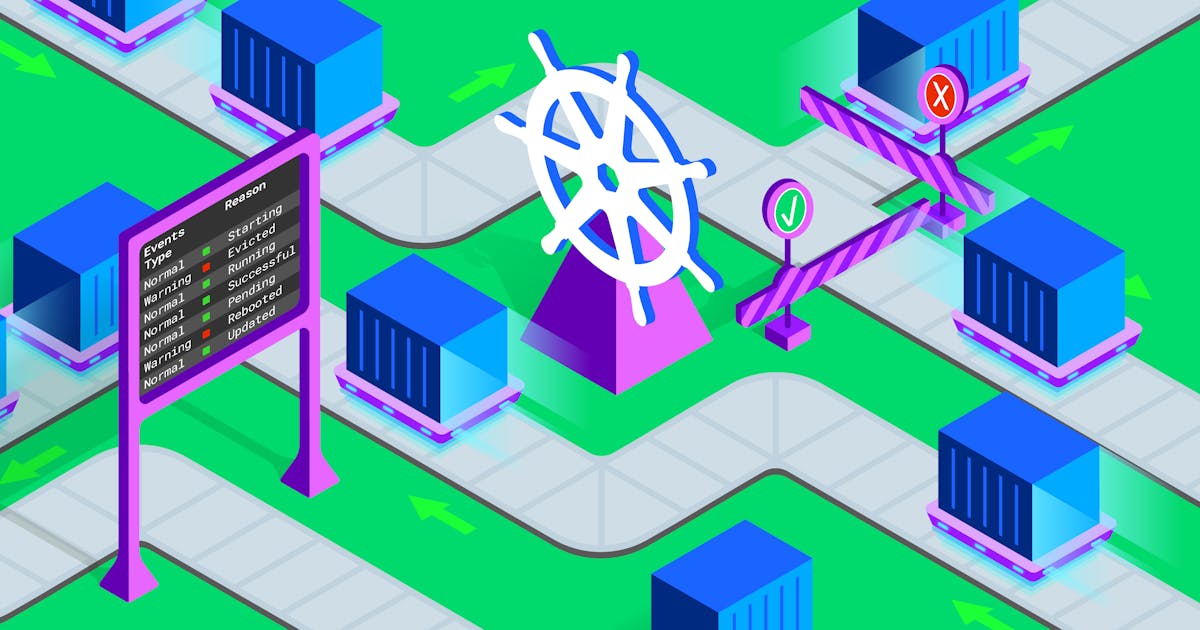kubectl Get Events For Specific Pod Troubleshooting
Learn how to efficiently retrieve and filter Kubernetes events for a specific pod using the powerful kubectl get events command.
Learn how to efficiently retrieve and filter Kubernetes events for a specific pod using the powerful kubectl get events command.
Kubernetes events provide insights into what happened in your cluster. They offer valuable information about the health and activities of your resources. This guide provides practical examples of using kubectl to retrieve and filter event data effectively.
List recent events in the default namespace:
kubectl get eventsList recent events in all namespaces:
kubectl events --all-namespacesList recent events for a specific pod:
kubectl get events --field-selector involvedObject.name=your-pod-nameWatch for events related to a specific pod:
kubectl events --for pod/your-pod-name --watchFilter events by type (e.g., Warning, Normal):
kubectl get events --types=Warning,NormalOutput events in YAML format:
kubectl get events -o yamlThis text describes how to interact with Kubernetes events using the kubectl command-line tool. It also offers to provide code examples in various programming languages for programmatically working with events, such as listing, filtering, and watching for changes.
You provided the commands to interact with Kubernetes events, but there's no code to write in this case! These are command-line instructions for the kubectl tool.
However, if you'd like to achieve similar results programmatically using a Kubernetes client library, I can provide examples. Let me know which programming language you prefer (e.g., Python, Go, Node.js) and I'll be happy to create code snippets demonstrating how to:
Just tell me your preferred language and what specific event-related actions you want to perform in your code!
--since flag: Use the --since flag with kubectl get events to retrieve events that occurred after a specific time. For example, kubectl get events --since=1h shows events from the last hour.kubectl get events --all-namespaces --field-selector involvedObject.kind=Pod,Deployment --types=Warning
| Task | kubectl Command |
|---|---|
| List recent events in the default namespace | kubectl get events |
| List recent events in all namespaces | kubectl events --all-namespaces |
| List recent events for a specific pod | kubectl get events --field-selector involvedObject.name=your-pod-name |
| Watch for events related to a specific pod | kubectl events --for pod/your-pod-name --watch |
| Filter events by type (e.g., Warning, Normal) | kubectl get events --types=Warning,Normal |
| Output events in YAML format | kubectl get events -o yaml |
By effectively utilizing these commands and understanding event characteristics, you can gain valuable insights into the operational status of your Kubernetes cluster and troubleshoot issues more efficiently. Remember that for persistent logging and advanced analysis, integrating with dedicated logging and monitoring solutions is recommended.
 kubectl events | Kubernetes | Synopsis Display events.
Prints a table of the most important information about events. You can request events for a namespace, for all namespace, or filtered to only those pertaining to a specified resource.
kubectl events [(-o|--output=)json|yaml|name|go-template|go-template-file|template|templatefile|jsonpath|jsonpath-as-json|jsonpath-file] [--for TYPE/NAME] [--watch] [--types=Normal,Warning] Examples # List recent events in the default namespace kubectl events # List recent events in all namespaces kubectl events --all-namespaces # List recent events for the specified pod, then wait for more events and list them as they arrive kubectl events --for pod/web-pod-13je7 --watch # List recent events in YAML format kubectl events -oyaml # List recent only events of type 'Warning' or 'Normal' kubectl events --types=Warning,Normal Options -A, --all-namespaces If present, list the requested object(s) across all namespaces.
kubectl events | Kubernetes | Synopsis Display events.
Prints a table of the most important information about events. You can request events for a namespace, for all namespace, or filtered to only those pertaining to a specified resource.
kubectl events [(-o|--output=)json|yaml|name|go-template|go-template-file|template|templatefile|jsonpath|jsonpath-as-json|jsonpath-file] [--for TYPE/NAME] [--watch] [--types=Normal,Warning] Examples # List recent events in the default namespace kubectl events # List recent events in all namespaces kubectl events --all-namespaces # List recent events for the specified pod, then wait for more events and list them as they arrive kubectl events --for pod/web-pod-13je7 --watch # List recent events in YAML format kubectl events -oyaml # List recent only events of type 'Warning' or 'Normal' kubectl events --types=Warning,Normal Options -A, --all-namespaces If present, list the requested object(s) across all namespaces. How to Collect Kubernetes Events and Extract Values | Learn what Kubernetes Events are, including their various types. Explore how to collect event data using two key commands: kubectl describe and kubectl get events, and discuss the use of different flags with kubectl get events for enhanced filtering and sorting.
How to Collect Kubernetes Events and Extract Values | Learn what Kubernetes Events are, including their various types. Explore how to collect event data using two key commands: kubectl describe and kubectl get events, and discuss the use of different flags with kubectl get events for enhanced filtering and sorting. Troubleshoot With Kubernetes Events | Datadog | Learn how to collect, monitor, and use Kubernetes events to root cause and troubleshoot problems with your containerized workloads.
Troubleshoot With Kubernetes Events | Datadog | Learn how to collect, monitor, and use Kubernetes events to root cause and troubleshoot problems with your containerized workloads. Kubectl connection refused intermittently - General Discussions ... | Version 1.24.0 cluster built with kubeadm Thanks for your time. My cluster seems to be fine other than I have to constantly restart kublet on the controller because after an irregular length of time I get connection refused using kubectl. Once kubelet is restarted I can use kubectl again. Sometimes it happens within a minute and other times it’s good for a few minutes. I need to figure out how to permanently fix it though please. I just noticed I still get connection refused even when kube...
Kubectl connection refused intermittently - General Discussions ... | Version 1.24.0 cluster built with kubeadm Thanks for your time. My cluster seems to be fine other than I have to constantly restart kublet on the controller because after an irregular length of time I get connection refused using kubectl. Once kubelet is restarted I can use kubectl again. Sometimes it happens within a minute and other times it’s good for a few minutes. I need to figure out how to permanently fix it though please. I just noticed I still get connection refused even when kube... Handling failed gitpuller lifecycleHooks - Zero to JupyterHub on ... | We are using gitpuller to distribute course materials in a z2jh setup (example here). Occasionally, gitpuller fails - either because the pod storage is full, or because the local repo cannot be automatically merged by gitpuller. When gitpuller fails, the pod doesn’t start, which means we can’t access the volume in order to clean things up. This leaves unhappy students. We tried substituting a python wrapper for the gitpuller command in the postStart hook, allowing us to catch and handle the exc...
Handling failed gitpuller lifecycleHooks - Zero to JupyterHub on ... | We are using gitpuller to distribute course materials in a z2jh setup (example here). Occasionally, gitpuller fails - either because the pod storage is full, or because the local repo cannot be automatically merged by gitpuller. When gitpuller fails, the pod doesn’t start, which means we can’t access the volume in order to clean things up. This leaves unhappy students. We tried substituting a python wrapper for the gitpuller command in the postStart hook, allowing us to catch and handle the exc...